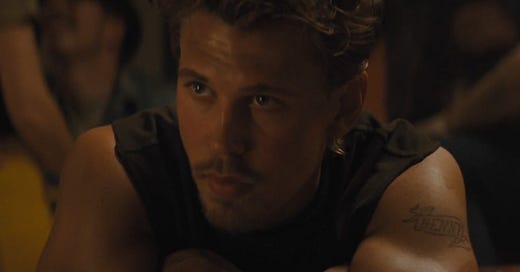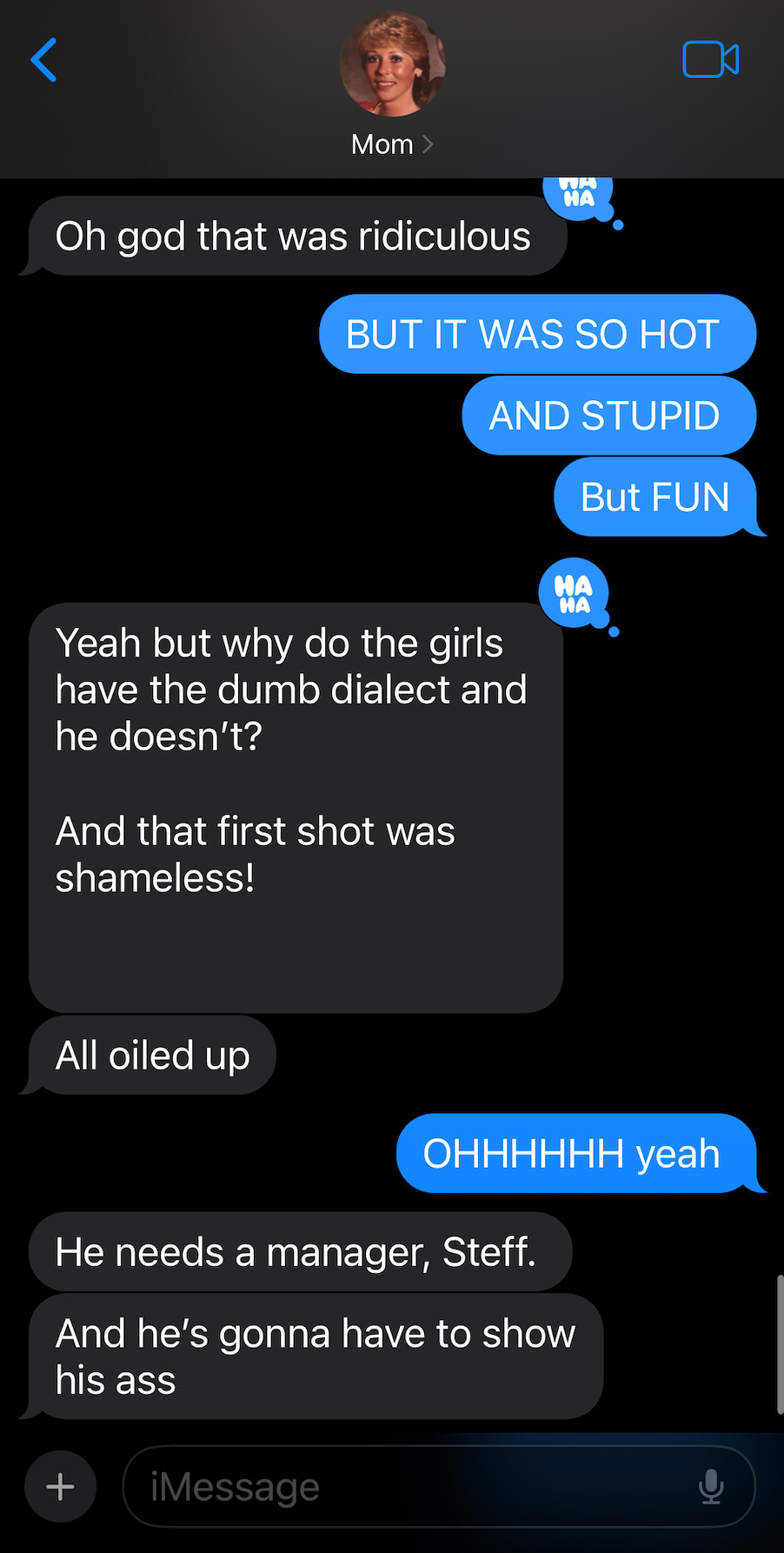I was in the mood for sex and violence when I walked into The Bikeriders on Friday night. I’d taken the day off to do nothing but enjoy my God given right to do nothing: I wrote, ate pizza, and read a favorite book in the sun. An evening of sex and violence felt like the perfect way to rev up my summer.
Women enjoy movies with sex and violence, you know – maybe not all of us, but certainly enough of us. We also require air, water, food, and rest to stay alive. Hair grows naturally on our arms, legs, faces, and genitals. We get acne. We get B.O. We fight. We fart. We sweat. We age. If you were to cut a woman’s head off, she would die instantly because of a lack of oxygenated blood to her very real, very functional brain. Women also have money, and with that money we purchase goods and services to keep us sheltered, fed, clean, clothed, and – fingers crossed – entertained.
I didn’t expect to be amazed when I walked into The Bikeriders on Friday night, but the first few minutes of the movie at least promised some silly fun. In 1960s Chicago, Kathy (played by Jodie Comer, who cannot carry this thing by herself but sure as hell tries) meets a girlfriend at what turns out to be a biker bar. At first, Kathy is understandably uncomfortable around the rowdy crowd of drunk, handsy men, but when she lays eyes on Benny (Austin Butler), she is instantly frozen to the spot. He saunters over to Kathy and sits across from her, looking about as sexy and intimidating as a jungle cat, a bald eagle, and a cobra rolled into one. His James Dean haircut is too perfect and his blue eyes are too kind (and his accent does not match Jodie’s), but I accepted that he belongs in this biker bar because I wanted to see what he did next.
What he does next is wordlessly stare at Kathy for what feels like forever as the camera lingers on his “how the hell is this even possible?” face. The whole thing is very hot and very stupid, and I could tell by the way the woman to my right involuntarily smiled and shook her head throughout the scene that we were both fighting the feminine urge to scream our horny heads off.
Goddamn, Austin Butler. Goddamn, my beloved Austy with lips like a sexy bounce house. What’s a celestial motherfucker like you doing in a place like this?
Eventually, Kathy leaves the bar and stands alone at a bus stop. Off-screen, we hear the vrooooooom of a motorcycle engine as Benny enters the frame and stops on the other side of the street. He doesn’t say a word. Instead, he waits until Kathy instinctively crosses the street and wraps her arms around him before they ride off into the night. Via Kathy’s narration, she tells us she married Benny five weeks later, and I gripped my drink tighter to prepare for a quick cut to a wedding night love scene. Alas, no dice. Instead, we see Benny recklessly ride his motorcycle while being chased by cops. From there, we meet the rest of the bikeriders, learn the politics of their little boys’ club, and get the vibe that these guys are too obsessed with bike riding to be good at anything else.
Disappointingly – and confusingly – the relationship between Benny and Kathy is hardly explored again. For the entire hour and fifty-six minute runtime, they don’t even so much as kiss. (At least, I don’t think they kiss. It’s possible I zoned out at the moment they sexlessly peck.) If the lingering, breathless display of my beloved Austy’s gorgeousness at the beginning of the movie wasn’t meant to make the audience desperate to see more of him and Kathy, then what, exactly, was the point? My guess is that director Jeff Nichols threw in an early seduction scene to appease the women he assumed would be dragged to the theater by their tough guy partners. Ha! As if straight women (and whoever else appreciates male beauty) wouldn’t be duped into buying tickets based on the Austy-centric marketing.
In an upsetting scene toward the end, a group of scary bikers at a party attempt to drag Kathy into a room and assault her. Benny is nowhere to be found, and Kathy is rescued in the nick of time by Johnny, the leader of the little boys’ club (played by a crotchety Tom Hardy, whose forehead is so refreshingly free of Botox it resembles a packet of bacon). When Kathy asks Benny later where he was when she needed him, he mumbles an excuse about having to go somewhere to do a thing. Ugh. I was relieved that nothing happened to Kathy — the fewer rape scenes in movies, the better. Still, I couldn't be disappointed in Benny’s misogynistic nonchalance because I didn’t know a thing about Benny. As far as I could see, Kathy should have had no trouble leaving him because I never saw Kathy fall in love with him. (Plus, he’s barely in the movie. Weird.)
A name like The Bikeriders hardly signals romance, but neither, for example, does Goodfellas. Like The Bikeriders, Goodfellas miserably fails the Bechdel test, but what Martin Scorsese did not fail to do 34 years ago was develop the relationship between Henry Hill and his wife, Karen. Without their cute dates and sexy chemistry and big ol’ mobbed up wedding, we wouldn’t root for Karen later when she wakes Henry up by pointing a gun in his philandering face. Emotional stakes aren’t girly — they’re necessary for good storytelling.
The lack of emotional stakes can also be seen in the relationships between the members of the little boys’ club. Unlike Joe Pesci, Robert De Niro, and Ray Liotta, the biker guys never come off as convincing friends. They don’t make each other laugh (and, therefore, they don’t make us laugh), and the absence of goofy hijinks makes the male camaraderie look even more boring than usual. We hear a little bit about loyalty and honor and blah, blah, blah, but until more men in real life stop thinking only of themselves, I’d love for Hollywood to cool it with the brotherhood schlock.
On my drive home, I put on the ELVIS soundtrack and thought about my beloved Austy. We don’t yet know where he’ll end up post-ELVIS, but I’m hoping with all my might that he won’t end up in another Bikeriders. If taking on a boring role in a boring movie about boring men was his way of legitimizing himself after posing and pouting through a two-and-a-half-hour Baz Luhrmann spectacle (as opposed to two measly minutes in The Bikeriders), I hope he learned his lesson. After all, the real Elvis never tried to distance himself from the hysterical women in the audience to win the approval of men – instead, he knelt down on the edge of the stage and kissed every woman he could.
Austy, I hope you’re taking notes.







I want to read every movie review you ever write.